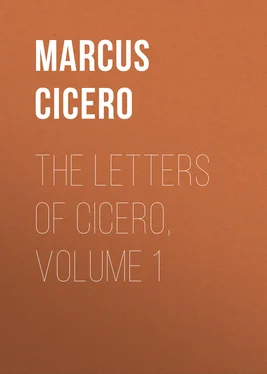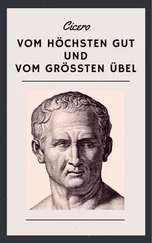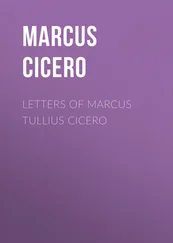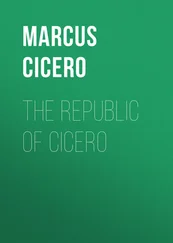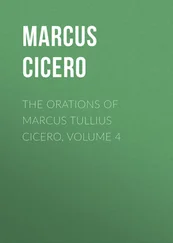Marcus Cicero - The Letters of Cicero, Volume 1
Здесь есть возможность читать онлайн «Marcus Cicero - The Letters of Cicero, Volume 1» — ознакомительный отрывок электронной книги совершенно бесплатно, а после прочтения отрывка купить полную версию. В некоторых случаях можно слушать аудио, скачать через торрент в формате fb2 и присутствует краткое содержание. Жанр: foreign_antique, Философия, foreign_edu, на английском языке. Описание произведения, (предисловие) а так же отзывы посетителей доступны на портале библиотеки ЛибКат.
- Название:The Letters of Cicero, Volume 1
- Автор:
- Жанр:
- Год:неизвестен
- ISBN:нет данных
- Рейтинг книги:4 / 5. Голосов: 1
-
Избранное:Добавить в избранное
- Отзывы:
-
Ваша оценка:
- 80
- 1
- 2
- 3
- 4
- 5
The Letters of Cicero, Volume 1: краткое содержание, описание и аннотация
Предлагаем к чтению аннотацию, описание, краткое содержание или предисловие (зависит от того, что написал сам автор книги «The Letters of Cicero, Volume 1»). Если вы не нашли необходимую информацию о книге — напишите в комментариях, мы постараемся отыскать её.
The Letters of Cicero, Volume 1 — читать онлайн ознакомительный отрывок
Ниже представлен текст книги, разбитый по страницам. Система сохранения места последней прочитанной страницы, позволяет с удобством читать онлайн бесплатно книгу «The Letters of Cicero, Volume 1», без необходимости каждый раз заново искать на чём Вы остановились. Поставьте закладку, и сможете в любой момент перейти на страницу, на которой закончили чтение.
Интервал:
Закладка:
He had doubtless made the acquaintance of Titus Pomponius, afterwards called Atticus, early in life. But it seems that it was their intimacy at Athens (b.c. 79), where Atticus, who was three years his senior, had been residing for several years, that began the very close and warm friendship which lasted with nothing but the slightest and most passing of clouds till his death. His brother Quintus was married to Pomponia, a sister of Atticus; but the marriage turned out unfortunately, and was a strain upon the friendship of Cicero and Atticus rather than an additional bond. This source of uneasiness meets us in the very first letter of the correspondence, and crops up again and again till the final rupture of the ill-assorted union by divorce in b.c. 44. Nothing, however, had apparently interrupted the correspondence of the two friends, which had been going on for a long time before the first letter which has been preserved.
Cicero the successful Advocate.
The eleven letters, then, which date before the consulship, shew us Cicero in full career of success as an advocate and rising official, not as yet apparently much interested in party politics, but with his mind, in the intervals of forensic business, engaged on the adornment of the new villa at Tusculum, the first of the numerous country residences which his growing wealth or his heightened ideas of the dignity of his position prompted him to purchase. Atticus is commissioned to search in Athens and elsewhere for objects of art suitable for the residence of a wealthy Roman, who at the same time was a scholar and man of letters. He is beginning to feel the charm of at any rate a temporary retreat from the constant bustle and occupations of the city. Though Cicero loved Rome, and could hardly conceive of life unconnected with its business and excitements, 3 3 "The city, the city, my dear Rufus—stick to that, and live in its full light. Residence elsewhere—as I made up my mind early in life—is mere eclipse and obscurity to those whose energy is capable of shining at Rome."— Fam. ii. 12 (vol. ii., p. 166).
and eagerly looked for news of the city in his absence, yet there was another side to his character. His interest in literature and philosophy was quite as genuine as his interest in the forum and senate-house. When the season came for temporarily withdrawing from the latter, he returned to the former with eager passion. But Tusculum was too near Rome to secure him the quiet and solitude necessary for study and composition. Thus, though he says (vol. i., p. 4 II (a i, 6) TO ATTICUS (AT ATHENS) Rome, December b.c. 68, æt. 38 I won't give you any excuse hereafter for accusing me of neglecting to write. It is you that must take care that with all your leisure you keep up with me. Rabirius's house at Naples, 29 for the improvement of which you have designs drawn out and completed in imagination, has been bought by M. Fonteius 30 for 130,000 sesterces (about £1,040). I wished you to know this in case you were still hankering after it. We may be quite satisfied, I think, with my brother's feelings towards Pomponia. He is with her at present in his villa at Arpinum, and has Decimus Turanius with him, who is great in belles lettres . The date of my father's death was the 28th of November. That is about all my news. If you light on any articles of vertu suitable for a gymnasium, which would look well in the place you wot of, 31 please don't let them slip. I am so delighted with my Tusculan villa that I never feel really happy till I get there. Let me know exactly what you are doing and intending to do about everything.
), "I am so delighted with my Tusculan villa that I never feel really happy till I get there," he often found it necessary, when engaged in any serious literary work, to seek the more complete retirement of Formiæ, Cumæ, or Pompeii, near all of which he acquired properties, besides an inheritance at Arpinum. 4 4 Even at these he found troublesome people to interrupt him. See vol. i., pp. 102 , 104 .
But the important achievements in literature were still in the future. The few letters of b.c. 68-67 are full of directions to Atticus for the collection of books or works of art suitable to his house, and of matters of private interest. They are also short and sometimes abrupt. The famous allusion to his father's death in the second letter of this collection, contained in a singleDeath of Cicero's Father. line— pater nobis decessit a.d. 111 Kal. Decembris —followed by directions to Atticus as to articles of vertu for his villa, has much exercised the minds of admirers, who do not like to think Cicero capable of such a cold-hearted sentence. It is certainly very unlike his usual manner. 5 5 Yet the announcement of the birth of his son (p. 16 ) and of the dangerous confinement of Tullia (vol. ii., p. 403) are almost equally brief.
He is more apt to exaggerate than understate his emotions; and in the first letter extant he speaks with real feeling of the death of a cousin. Elsewhere—as we have seen—he refers to his father with respect and gratitude. How then are we to account for such a cold announcement? Several expedients have been hit upon. First, to change decessit to discessit , and to refer the sentence to the father's quitting Rome, and not life; in which case it is not easy to see why the information is given at all. Second, to suppose it to be a mere answer to a request for the information on the part of Atticus; in which case the date must refer to some previous year, or the letter must be placed considerably later, to allow of time for Atticus to hear of the death and to write his question. In favour of the first is the fact that Asconius (§ 82) says that Cicero lost his father when he was a candidate for the consulship (b.c. 64). Some doubt has been thrown upon the genuineness of the passage in Asconius; and, if that is not trustworthy, we have nothing else to help us. On the whole I think we must leave the announcement as it stands in all its baldness. Cicero's father had long been an invalid, and Atticus may have been well aware that the end was expected. He would also be acquainted with the son's feelings towards his father, and Cicero may have held it unnecessary to enlarge upon them. It is possible, too, that he had already written to tell Atticus of the death and of his own feelings, but had omitted the date, which he here supplies. Whatever may be the true explanation—impossible now to recover—everything we know of Cicero forbids us to reckon insensibility among his faults, or reserve in expressing his feelings among his characteristics.
The Prætorship, b.c. 66.
In the next year (b.c. 67) we find Cicero elected to the prætorship, after at least two interruptions to the comitia , which, though not aimed at himself, gave him a foretaste of the political troubles to come a few years later. He is, however, at present simply annoyed at the inconvenience, not yet apprehensive of any harm to the constitution. The double postponement, indeed, had the effect of gratifying his vanity: for his own name was returned three times first of the list of eight. His prætorship (b.c. 66) passed without any startling event. The two somewhat meagre letters which remain belonging to this year tell us hardly anything. Still he began more or less to define his political position by advocating the lex Manilia , for putting the Mithridatic war into the hands of Pompey; and one of his most elaborate forensic speeches—that for Cluentius—was delivered in the course of the year: in which also his brother Quintus was elected to the ædileship.
b.c. 65-64. Preparations for the Consulship.
So far Cicero had risen steadily and without serious difficulty up the official ladder. But the stress was now to come. The old families seem not to have been so ready to oppose the rise of the novus homo to the prætorship. It was the consulship on which they tried to keep a tight hand. Accordingly, immediately after the year of his prætorship, we find him anxiously looking out for support and inquiring who are likely to be his competitors. The interesting point in regard to this is his connexion with Catiline. In his speech in the senate delivered in the following year ( in toga candida , b.c. 64) he denounced Catiline in the most violent language, accusing him of every conceivable crime; yet in b.c. 65 he not only contemplated being elected with him without any expression of disgust, but even considered whether he should not undertake his defence on some charge that was being brought against him—perhaps for his conduct during the Sullan proscriptions. To whitewash Catiline is a hopeless task; and it throws a lurid light upon the political and moral sentiments of the time to find Cicero even contemplating such a conjunction.
Читать дальшеИнтервал:
Закладка:
Похожие книги на «The Letters of Cicero, Volume 1»
Представляем Вашему вниманию похожие книги на «The Letters of Cicero, Volume 1» списком для выбора. Мы отобрали схожую по названию и смыслу литературу в надежде предоставить читателям больше вариантов отыскать новые, интересные, ещё непрочитанные произведения.
Обсуждение, отзывы о книге «The Letters of Cicero, Volume 1» и просто собственные мнения читателей. Оставьте ваши комментарии, напишите, что Вы думаете о произведении, его смысле или главных героях. Укажите что конкретно понравилось, а что нет, и почему Вы так считаете.
